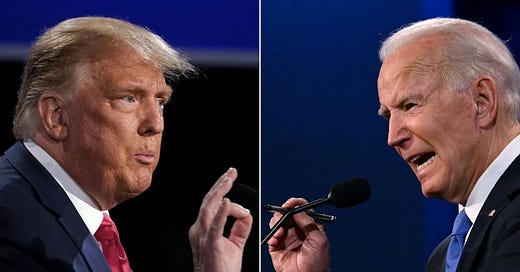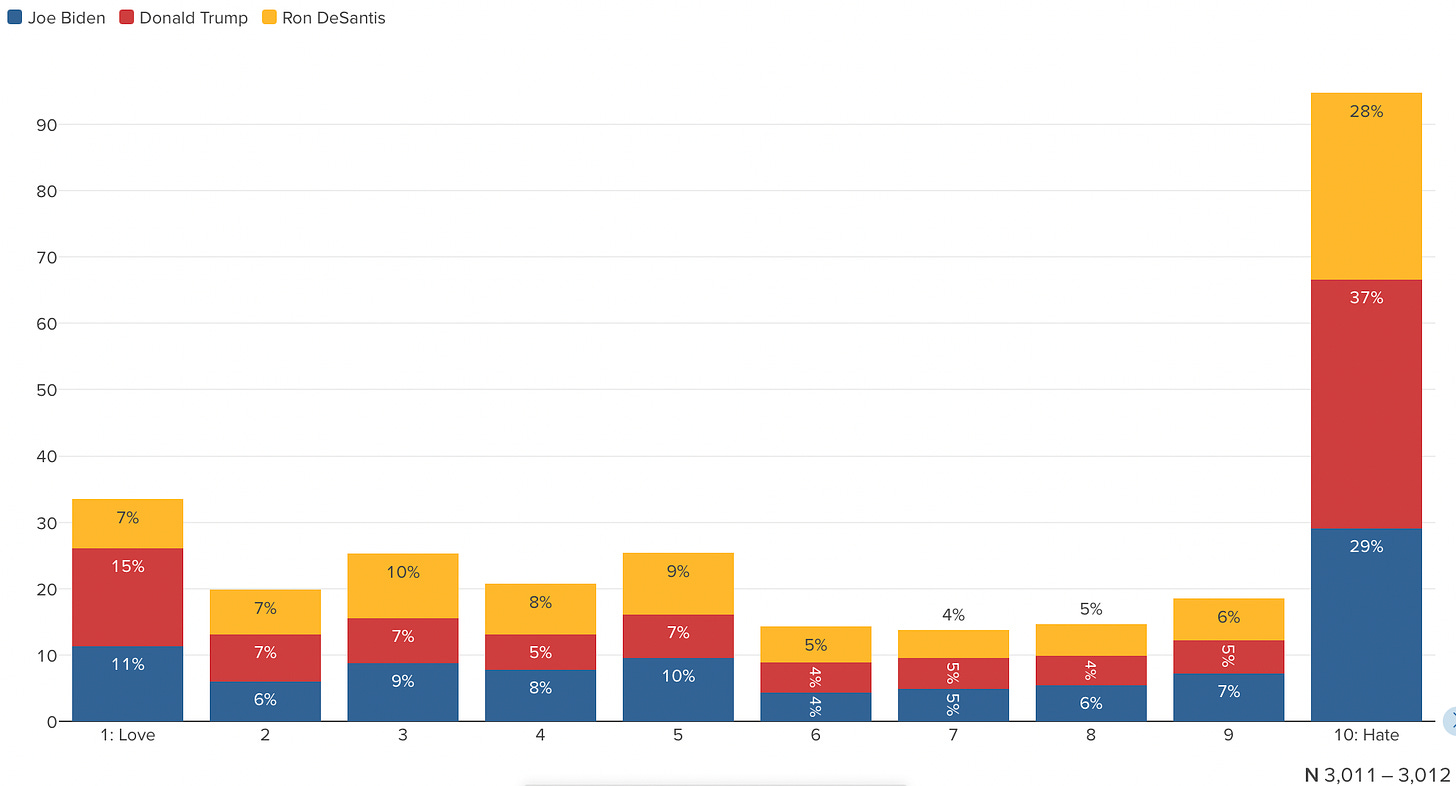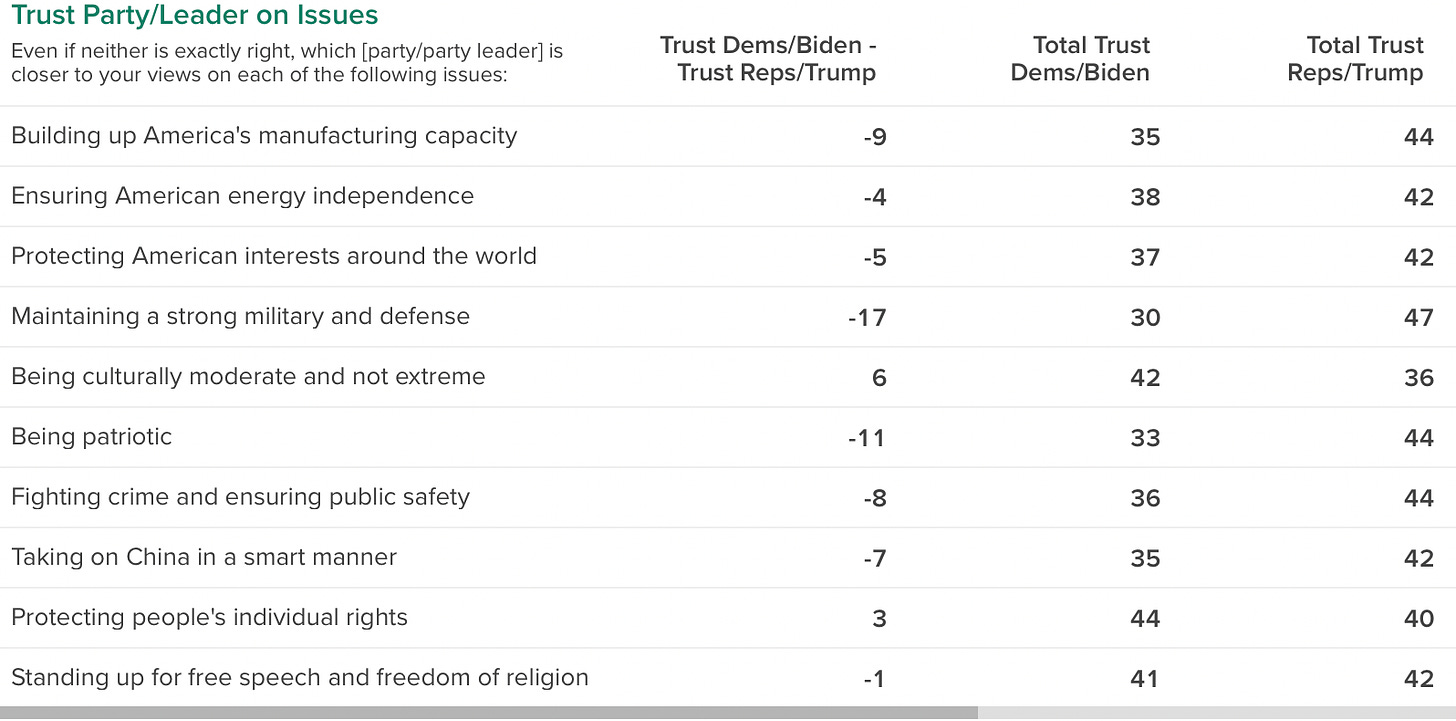Introducing the 2024 Patriot Index
First results from wave one of the new TLP/YouGov presidential election tracker.

The Liberal Patriot (TLP) is pleased to present the results from our first round of polling—conducted with our good partners at YouGov—examining the most important issues and political ideas shaping the 2024 presidential election. TLP and YouGov plan to do five waves of research through the early part of next year, each wave including around 3000 interviews with registered voters for a total study covering more than 15,000 Americans by the time primary voting begins in earnest next year.
The results of the poll are available to everyone, and we encourage people to dive into these fascinating results. We plan to roll out analysis of this research in a series of posts over the next two weeks.
Among the initial findings:
President Biden currently holds a marginal lead in his re-election effort against likely GOP nominee and former president, Donald Trump, and against potential contender Gov. Ron DeSantis. If the election for president were held today between Biden and Trump, 47 percent of registered voters would choose President Joe Biden and 41 percent would choose Trump, with seven percent not sure, four percent preferring another candidate, and two percent saying they wouldn’t vote at all. Undecided voters are leaning more Trump than Biden at this point when pressed to choose, making the combined two-way vote 51 percent to 47 percent, Biden over Trump, with the push.
More than nine in 10 Democrats would currently back the incumbent Biden while more than eight in 10 Republicans would back Trump. Notably, strict independents (not including independents who lean to one party or the other) today would support Trump over Biden by a 41 percent to 25 percent margin, with 17 percent undecided and another 10 percent preferring someone else.
In a hypothetical match-up between President Biden and Gov. Ron DeSantis, Biden leads by a 45 percent to 39 percent margin, with eight percent not sure and five percent preferring another choice (50 percent to 48 percent with combined push of undecided voters).
On a new ‘love-hate’ measure we designed for this project, Biden receives tepid affections from voters while Trump generates the most amount of voter hate. TLP/YouGov created a novel new measure of emotional intensity—the ‘love-hate’ scale—to gauge the depth of feelings for and against the major presidential contenders.
Looking at combined ‘love’ (from 1-5) and ‘hate’ (from 6-10) ratings in the chart below, all three major presidential contenders receive more aggregate hate than love with Trump receiving the highest level of overall hate at 56 percent.
Digging deeper into these findings, neither Biden nor Trump emerge with particularly strong positive feelings from Americans—only 11 percent of voters intensely love Biden while only 15 percent intensely love Trump (measured as 1 on the scale). In contrast, 29 percent of voters intensely hate Biden and 37 percent intensely hate Trump (measured as 10 on the scale).
As expected, partisans express far more intense feelings about the candidates in both directions than do independents. For example, nearly one quarter of Democrats intensely love Biden and more than three in 10 Republicans intensely love Trump (rating each a 1 on the scale, respectively). In comparison, seven in 10 Democrats intensely hate Trump and roughly six in 10 Republicans intensely hate Biden (rating each a 10 on the scale, respectively).
Independents are far less emotionally attached to either candidate but hold more hatred than love by sizable margins: less than one in 10 independents intensely love either Biden or Trump compared to roughly three in 10 who intensely hate both party leaders. Independents also report the highest level of indifference towards the candidates with around one in 10 saying they don’t have feelings one way or the other towards Biden or Trump, and around a quarter having no feelings about DeSantis.
Republicans currently hold small leads on most of the 10 dimensions of national strength and competitiveness tested in our new Patriot Index. Given TLP’s commitment to a “pro-worker, pro-family, pro-America” agenda in politics, we wanted to explore how voters perceive the positions of the two major parties in relation to their own views on 10 measures of economic nationalism, cultural moderation, and basic American values and interests.
In general, the overall Democratic Party brand led by President Biden is unimpressive in relation to an unpopular Republican Party led by Donald Trump.
As seen in the table below (combined results from a split sample test), Republicans and Trump currently hold narrow leads over Democrats and Biden on eight of the 10 dimensions in the Patriot Index. Democratic deficits to Republicans are greatest on ‘maintaining a strong military and defense’ (-17 net) and ‘being patriotic’ (-11 net). Perhaps more interesting given core parts of the Biden economic agenda, Democrats also trail Republicans on ‘building up America’s manufacturing capacity’ (-9 net), ‘taking on China in a smart manner’ (-7 net), and ‘ensuring American energy independence’ (-4 net).
Democrats and Biden are strongest on the dimensions of ‘being culturally moderate and not extreme’ (+6 net) and on ‘protecting people’s individual rights’ (+3 net). The two parties and leaders are essentially tied on who voters trust more on ‘standing up for free speech and freedom of religion’.
Notably, strict independent voters break towards the GOP and Trump on all 10 of these Patriot Index dimensions. For example, independents say Republicans and Trump are closer to them on ‘building up American manufacturing’ by a 43 percent to 16 percent margin with 29 percent saying neither party is closer to their views on this issue. Independents also favor Republicans and Trump over Democrats and Biden on ‘ensuring American energy independence’ by a 44 percent to 17 percent margin—and roughly the same margin on which party is closer to them on ‘being patriotic’—with around three in 10 saying neither party is close to their views on both fronts, respectively.
Despite a weak overall job approval rating, and on key issues like inflation and crime, Biden holds important personal advantages over Trump—particularly on perceptions of being moderate and not extreme. President Biden’s overall job approval rating is 43 percent in this wave with 55 percent disapproving of the way Biden is handling his job. Even worse, only 38 percent of voters approve of Biden’s handling of inflation and the economy with an underwhelming 40 percent approving of the way he is handling the issue of crime.
Yet in an indication of how critical relative negative perceptions of Donald Trump may be for the Biden re-election effort, Biden himself enjoys a 10-point advantage over Trump in terms of which leader is closer to voters on ‘being culturally moderate and not extreme’ (45 percent to 35 percent, from the split sample test of leaders alone).
In the end, Biden’s personal brand compared to Trump’s may be his saving grace.
Biden is clearly a weak incumbent at this early stage in the race.
However, ahead of a potential ‘pox on both of your houses’ election in 2024, Biden’s character advantages over Trump—coupled with deeper hatred of the former president than of the current one among many voters—may be enough for him to maintain a lead in the national horserace and on key dimensions likely to shape the outcome.








